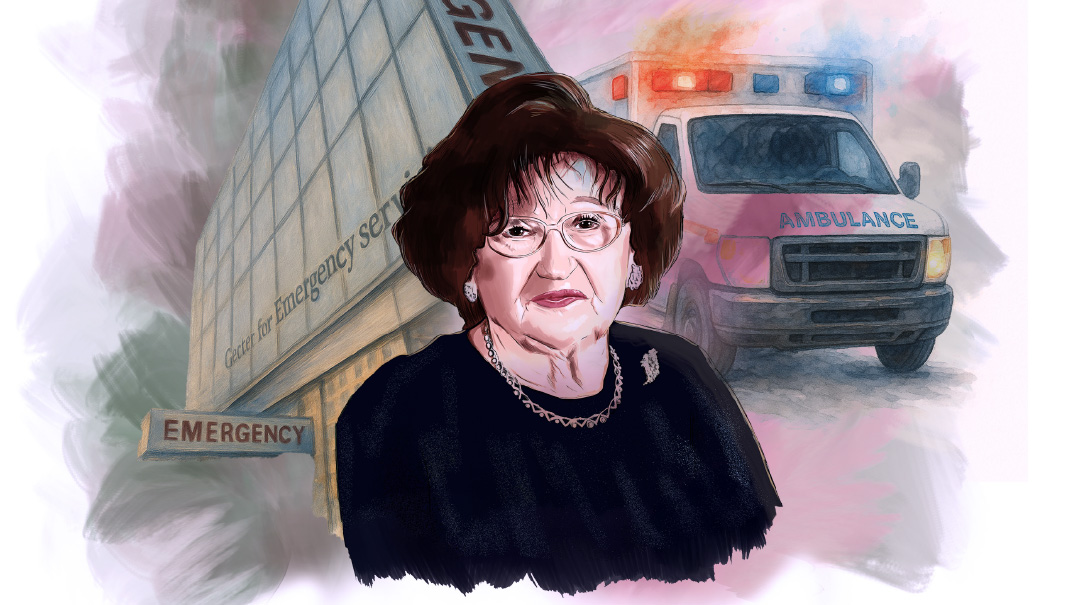Melatonin: A Wake-up Call
| February 27, 2024Sweet dreams? Keep your eyes wide open before popping that melatonin

B
edtime at Rochel’s house is as smooth as their 100-percent cotton sheets. When the clock inches close to six, a freshly bathed and pajamaed duo scampers to the kitchen.
“Time for your melatonin!” Rochel says to her youngest children, Esti and Moishy. Both down the sweet, chewy supplements, and then teeth brushing, Shema, and a bedtime story follow. Within half an hour, both children are yawning widely.
“I’m tired,” Esti complains.
“So am I,” Moishy mumbles, rubbing his eyes. Rochel tucks them into bed, softly says goodnight, and leaves the room. Five minutes later, peace and quiet reign.
Sounds like an impossible dream?
“Bedtime wasn’t always like that,” Rochel, a mother of nine, admits. “When my kids were younger, they would lie in bed for hours. They just couldn’t fall asleep. Mornings were terrible, and my kids were so cranky during the day. A cousin of mine told me about melatonin, and I decided to try it out. From then on, bedtime was a dream. Melatonin is just another part of our bedtime routine. One dose, and my little ones can practically put themselves to bed! I need my evenings and my children need their sleep — it’s a win-win situation for everyone!”
Rina doesn’t use Rochel’s system. “I use melatonin after trips to deal with the jet lag — only half a gummy for each child. It worked to put my kids to sleep, but it didn’t aways help them stay asleep. And I definitely won’t use it on a nightly basis. I’m too nervous. Who knows what it can do? Maybe it’s addictive?”
“The goal is a good night’s sleep,” Mashy asserts. “Some of my kids needed melatonin, and some of them didn’t. I have several children with ADHD, and they really needed melatonin, otherwise they simply couldn’t sleep. My pediatrician didn’t think a low dose would be a problem, and I’ve found that it really works.”
Deenie is curt and firm. Does she ever use melatonin for herself or her children? “Never. Who can tell if it’s really safe?”
So many different (and strong!) opinions regarding melatonin. So much confusion. So many questions.
Is it merely “nature’s sleeping pill,” a harmless way to send our kids (and ourselves) off to dreamland… or is there a sinister side to the “hormone of darkness?”
Maestro Melatonin
Dr. Aaron Lerner was a dermatology professor at Yale who wanted to treat skin diseases. When he and his colleagues isolated a hormone called “melatonin” from the pineal gland of a cow in 1958, they noticed that it lightened frogs’ skin color. This intriguing fact didn’t fire up the medical community until 1981, when psychiatrist Dr. Alfred Lewy discovered that melatonin production in humans is inhibited by bright light. This led to the discovery that melatonin is instrumental in human sleep. Studies on melatonin and its connection to sleep received a lot of attention in the 1990s, when it started being sold as a supplement.
But it’s more complicated than a knock-you-out sleeping pill. In fact, sleep itself is complicated — not simply the blank space between lights-out and the annoying ringing of your alarm clock. It’s a brilliant, carefully orchestrated symphony.
Essentially, two main systems help us sleep. First, the internal biological clock, or circadian rhythm, “creates a cycling, day-night rhythm that makes you feel tired or alert at regular times of night and day,” Dr. Matthew Walker explains in Why We Sleep. For the lover of scientific terminology, the name of this clock is the suprachiasmatic nucleus (try saying that three times fast…). It functions like a third eye, receiving light messages from the retina. When it perceives darkness, the brain then increases melatonin production.
The second system is chemical based. Had a tough workout and feel exhausted? Stayed up all night with the baby and can’t keep your eyelids open without toothpicks? You have an overload of “adenosine,” the chemical that makes us feel tired.
Think of sleep as an orchestra — the circadian rhythm, adenosine, and all the complex pieces of the process are poised, holding their instruments, ready to begin the lullaby that rocks you to sleep — and melatonin as the maestro. When the amount of melatonin rises, it signals the body: “It’s dark!” and the instruments of sleep begin to play. When the sky lightens, the messages are reversed, melatonin levels drop, and the song of slumber morphs into the chirping of early birds — and your alarm clock.
Billion-Dollar Bandwagon
“Around 70 million Americans use melatonin on a regular basis,” remarks Doron Lazarus, an integrative sleep coach and founder of Executive Sleep Consulting. Adult use of melatonin quintupled between 1998 and 2018, according to the National Institutes of Health, and the number of children using melatonin has risen 530 percent. Today it’s a $2 billion industry.
“I wouldn’t necessarily recommend melatonin on a regular basis,” says Dr. Kelly Ishizuka of Pediatric Services in Minneapolis, Minnesota. “But we do know that it’s totally fine for jet lag. You can use it for a few days, I would say up to five, to reset the body’s circadian rhythm.”
For the severely sleep-deprived, Doron Lazarus allows clients to take melatonin. “Melatonin is better than sleeping pills,” he explains. “But I don’t recommend it for patients suffering from anxiety or addictions that prevent them from sleeping. In those cases, melatonin is not solving the problem.”
Older adults — anyone over 65 — produce less melatonin, which is why they have a harder time sleeping. Studies in melatonin use among American seniors has shown some success. Since many people over 65 take other medications, speaking to a physician before taking melatonin is essential.
Ever heard of delayed sleep disorder? It disrupts the internal body clock, causing a two-or three-hour delay in the sleep-wake cycle. If you’ve ever pulled a late night, only to find yourself unable to drag yourself out of bed in the morning, you have firsthand experience of how a patient with this syndrome feels every day. Melatonin helps reset the biological clock, encouraging sleep.
“Children who are neurodivergent, such as children with autism or ADHD, can use melatonin safely for a longer period of time,” says Dr. Nesanel Breningstall, a pediatric neurologist at St. Gillette’s Specialty Healthcare in St. Paul, Minnesota. Studies have shown melatonin is helpful for this population.
For the average adult, “Melatonin is very safe,” Dr. Breningstall explains. “There are no established long-term adverse effects. On the other hand, it needs to be taken safely. The dose needs to be correct, and the supplement verified for reliability. Relying on melatonin can keep people from establishing proper sleep habits, so it shouldn’t be taken forever.”
The dose should be small. “Especially for children, half a milligram to one milligram should be enough,” says Dr. Ishizuka. “If half a milligram doesn’t seem to be working, up the dose to one milligram — gradually. Melatonin taken on a full stomach doesn’t work as well.”
“Melatonin should be taken a half hour to two hours before bedtime,” remarks Dr. Eugene Shubin of Community Pediatrics, in Mishawaka, Indiana. “This helps the body become tired naturally, since it takes time for melatonin to be absorbed in the GI tract.”
The Dark Side
The next $2 billion question: Is melatonin safe? The answer, annoyingly enough: Usually. It depends.
A 2005 study proved that melatonin supplements are generally safe for healthy adults when used for three months or less. Some later studies seem to show no major long-term effects on adults, even when used for longer than three months. Melatonin isn’t addictive and isn’t as dangerous as prescription sleeping medications. However, there can be side effects, especially with high dosages (more than ten milligrams).
Documented side effects include moodiness, headaches, dizziness, and stomachaches. A major complaint, especially for children, is drowsiness during the day. Another interesting side effect of melatonin is extremely vivid dreams, and sometimes night terrors. On the other hand, melatonin can sometimes banish a child’s nightmares. Each person reacts differently to melatonin, and that’s one reason “it depends.”
“One of the main issues with melatonin is that there isn’t a large body of research on the long-term effects, especially in children,” Dr. Ishizuka explains. “Another concern is whether melatonin supplements can make our pineal gland get lazy and stop producing enough melatonin of its own. The truth is, we just don’t know for sure.”
While melatonin isn’t addictive in the typical sense, it can become habit-forming. “Sometimes clients start to think that they can’t sleep without melatonin. In those cases, we wean people off melatonin gradually,” says Doron.
Children younger than three shouldn’t be taking melatonin, and no neurotypical child should be taking it every night, according to Dr. Judith Owens, codirector of the Sleep Center at Boston Children’s Hospital. Sleep is crucial, but so is the body’s ability to learn how to sleep on its own.
An issue that isn’t as concrete, but still worrying, is the effect of melatonin on puberty. In a study referenced by Dr. Madeleine Grigg-Damberger and Dr. Dessislava Ianakieva, melatonin inhibited puberty in cats, but caused premature puberty in primates. There is no concrete evidence that melatonin has a similar effect on children, but it’s yet another gray area with no clear answers.
“A problem related to melatonin is ovedosing,” adds Dr. Breningstall. It’s not easy to overdose on melatonin, but from 2012 to 2021, more than 260,000 cases of melatonin poisoning involving children were reported. Most children had no alarming symptoms and recovered, some were excessively drowsy and hard to waken, while two children died. It sounds alarming, but many more children die each year from an overdose of commonly used iron pills (which tend to look temptingly like candy).
The dosage and amount of time that melatonin is safe will vary depending on whether the subject is a child or adult. Each individual may experiment to find the most effective dose. Some children fall asleep quickly with one milligram, others with half a milligram of melatonin. Rochel gives her youngest children only a quarter of a melatonin gummy — a very small dose — and she still finds it effective.
Dr. Shubin puts it clearly: “Melatonin is safe if used properly.”
Nobody knows what melatonin does if used in large doses for a long period of time — say for a decade — for both children and adults. It might be fine — or it might not.
What You See Is (Often) Not What You Get
When you stand in an endless line at the pharmacy, waiting for that bottle of bubblegum pink Amoxicillin for your daughter’s ear infection, you know it’s FDA (Food and Drug Administration) approved. The purity of the medication has been tested, and the contents in the bottle match the label. What you see is exactly what you get.
The biggest problem with melatonin is that what you see is (often) not what you get. Melatonin in the US is considered a supplement, not a medication, and therefore not subject to the control of the FDA.
A well-known study in 2017 tested 30 brands of melatonin, with shocking results. More than 70 percent contained a different amount of melatonin than was stated on the label. Some supplements contained 80 percent less melatonin than they were supposed to, while a few had 400 times more melatonin than stated! Even more worrisome, some supplements contained serotonin, a hormone that does require a prescription — even in the US.
“Melatonin is not sold over the counter in many other countries,” Dr. Shubin remarks. “In places like the UK and Australia you need a prescription.” In those countries, melatonin is considered a highly controlled substance.
“Melatonin isn’t something you order online without careful checking,” warns Dr. Ishizuka. “Make sure that the manufacturer of the melatonin supplement has been verified by a third party.” The label GMP (Good Manufacturing Practices) would be one such third party that certifies the purity of a product.
The Step Before
It’s the third time your precious youngster has emerged from his bed — and it’s three hours past his bedtime. Melatonin is looking more and more enticing. Is it time to rush to the pharmacy and buy an economy-sized bottle of sleep incarnate?
Actually, no.
“Before using melatonin, you need to look into your child’s sleep hygiene, or sleep habits,” Dr. Shubin explains.
Regular bedtimes, physical activity during the day, exposure to sunlight, and a calming bedtime routine can help kids (and adults) learn to sleep better. No screentime for two hours before bedtime is also recommended (blue light from screens can fool the brain into thinking it’s daytime, which hinders melatonin production). A cool, comfortable room with no light, darkening shades, and a white noise machine are great ways to create a positive sleeping environment.
A note to all voracious readers — exciting thrillers don’t make the best bedtime reading! Ever stayed up (almost) until dawn because you had to finish the book? Then you know about the terrible fatigue of The Day After. Only bland books in bed! (Truthfully, the recommendation is for no books in bed — but it’s impossible to endorse such heresy.) A small, melatonin-rich bedtime snack — a handful of walnuts, grapes, sunflower seeds, cherries, or a hardboiled egg — would all work.
The Importance of Sleep
“Sleep is an investment,” Doron Lazarus says simply. “It’s the currency that allows us to be productive.” Sometimes the price for sleep is not a pill, but a lifestyle change. It’s a price worth paying — because if you can’t, the results can be disastrous.
Michael Corke was one person who couldn’t sleep. At all. He had a rare genetic disorder called Fatal Familial Insomnia. He was desperate; every painful movement of his eyelids crying for relief. After eight weeks, the sleep-starved 42-year-old man’s mind began to deteriorate. Six months with no sleep left Corke suffering from dementia, unable to care for himself or communicate beyond some basic hand movements. A few weeks later, he passed away. Fatal Familial Insomnia has destroyed every documented patient within ten months, hammering home the stark message: Lack of sleep can kill.
Conversely, sleep is life. It gives us a chance to rejuvenate our minds, organize our thoughts and emotions, and repair the daily damage a working body suffers. Some of us fall asleep as soon as our heads touch the pillow. Some of us need to make a few changes to our sleep environment, and then we’ll find ourselves nodding off quickly. And some of us may need melatonin supplements — taken correctly — to take that first step into dreamland.
Because as Dr. Matthew Walker said, “The best bridge between despair and hope is a good night’s sleep.”
WARNING!
Dr. Ray Sahelian, of Melatonin: Nature’s Sleeping Pill, offers the following words of advice: “Melatonin is a very safe supplement, yet no substance is perfect. Until we know more about the long-term effects, it’s best we follow precautions.” Studies have shown risks with some of the items on these lists, while others have never been fully explored.
Don’t Take Melatonin If You Are…
pregnant
nursing
taking antidepressants
taking other medications regularly (e.g., blood pressure medication)
Don’t Take Melatonin If You Have…
an autoimmune disorder (e.g., diabetes)
a tendency toward major depression
a hormonal imbalance
Beyond Sleep: Other Uses for Melatonin
Sure, melatonin can help you sleep. But did you know that scientists are discovering new benefits of melatonin — far beyond slumber? Here are some:
- Cardiovascular Disease: Cardiovascular disease is a leading cause of death in the US. Melatonin protects the heart against injury and strengthens the cardiac muscles. Other studies show that melatonin can also lower cholesterol levels.
- Cancer: Melatonin is a powerful antioxidant and can protect our DNA from damage that often leads to cancer. It can also kill cancer cells that are already present and stop cancer cells from multiplying rapidly. Melatonin has been used in patients with advanced stage cancers or solid tumors. “Taking 20 mg of melatonin once daily versus conventional treatment alone, improved the rate of complete or partial remission by nearly 50 percent, increased the one-year survival rate by 45 percent, and decreased the devastating side effects of conventional therapy,” says Dr. Claudia Kelley, PhD. “And there were no adverse side effects.”
- Alzheimer’s: A lot of recent research is focused on melatonin’s ability to help delay the onset of Alzheimer’s. Melatonin protects cells from damage and fights the beta amyloid plaque that is one of the underlying causes of Alzheimer’s.
- Osteoporosis: Animal research suggests melatonin can help with bone repair and bone density. A recent study found that melatonin seemed to restore bones and prevent bone loss. Human trials have not been done.
- Obesity: Obesity often comes along with stress, emotional eating, sleep deprivation, and hormonal imbalance. Women who binge at night are more likely to have a disturbed circadian rhythm. Anyone who finds themselves awake late at night with a bar of chocolate (or cake, cookies, etc.) knows the feeling. Regulating the sleep cycle can help. Melatonin also encourages the body to burn fat, rather than storing it. But before rushing out to by a bottle and get on the fast track to losing those stubborn pounds, be aware that current trials have only been done on rats.
- Longer Life?: As we age, we produce less melatonin. The idea is that this leads to many issues of the elderly. In clinical trials, animals given melatonin lived 20 percent longer than their peers, and retained their youthful appearance (whatever that means for a laboratory rat). Since melatonin strengthens the immune system and is a powerful anti-inflammatory agent, perhaps it can prolong lives? The jury’s out on this one — but it’s definitely an intriguing idea.
(Originally featured in Family First, Issue 883)
Oops! We could not locate your form.







